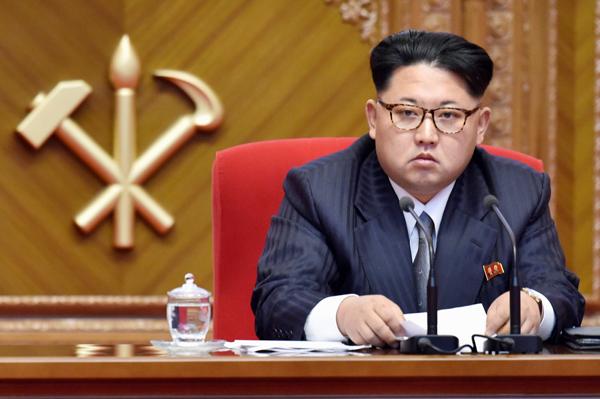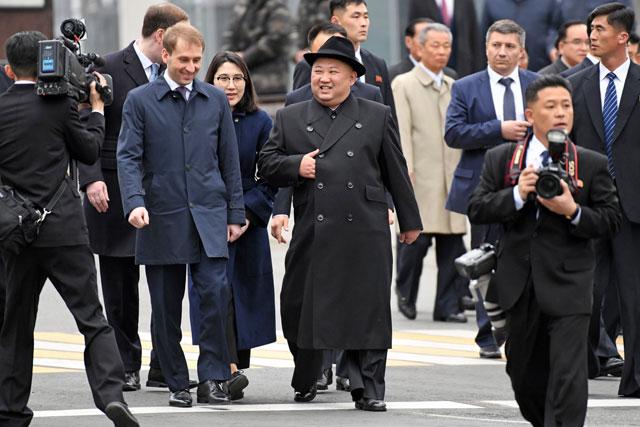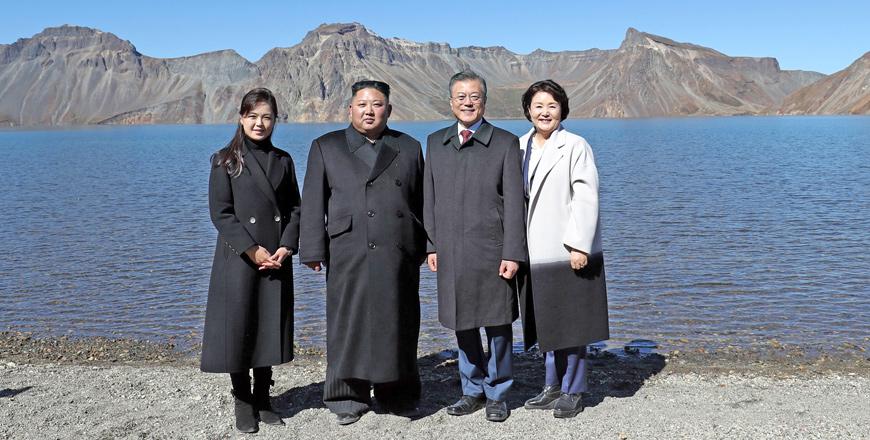You are here
North Korea crowns Kim party chief as rare congress closes
By AFP - May 09,2016 - Last updated at May 09,2016

North Korean leader Kim Jong-un attends the first congress of the country’s ruling Workers’ Party in 36 years in Pyongyang, North Korea, in this photo taken by Kyodo on Monday (Kyodo/via Reuters)
PYONGYANG — North Korea on Monday wrapped up its first ruling party congress for 36 years — an event seen as a formal coronation for leader Kim Jong-Un, who was appointed to the post of party chairman.
Thousands of delegates clapped and cheered enthusiastically as the country's official head of state, Kim Yong-nam, announced the new title which cements Kim's status as the isolated state's supreme ruler.
For the first time since they arrived last week, foreign journalists were allowed a rare glimpse inside the delegate hall, which was festooned in red and gold banners carrying the party's logo.
Serious-looking men, and the occasional woman, dressed in sombre suits and servicemen weighed down by chests-full of medals filled row after row of red seats in the cavernous hall.
The congress, which opened on Friday, has given 33-year-old Kim a podium to secure his status as rightful inheritor of the one-party state founded by his grandfather, Kim Il-sung, who also held the title of party chairman.
"Kim's new position makes it very clear that the whole party meeting is only aimed at solidifying his legitimacy as the new leader," said Koh Young-hwan, a former North Korean diplomat who defected to the South in 1991.
Koh, who is now vice head of the South's state-run Institute for National Security Strategy, said the rarity of the party congress conferred real authority on the new role.
"All past leaders of the party were named at a party congress... so this was a perfect coronation," he told AFP in Seoul.
BBC reporter expelled
Around 130 foreign reporters were invited to cover the congress, although their movement was tightly controlled, and their only access to the event came on the last day.
The authorities announced Monday that they were expelling a BBC journalist, Rupert Wingfield-Hayes, for "speaking very ill of the system and the leadership" in his reports.
He had initially been detained on Friday and questioned for eight hours.
"We are never going to allow him back into the country for any reporting," said an official with the North's National Peace Committee.
As well as raising Kim to the post of party chairman, the congress formally endorsed his legacy "byungjin" doctrine of twin economic and nuclear development.
Delegates on Sunday unanimously adopted Kim's working report on the party, which stressed the need to strengthen the North's nuclear arsenal "both in quality and quantity".
North Korea has carried out two of its four nuclear tests under Kim's leadership, most recently in January when it claimed to have tried out a powerful hydrogen bomb — a claim experts have disputed.
There has been growing concern that Pyongyang may be on the verge of conducting a fifth test, with satellite imagery showing activity at the North's Punggye-ri nuclear test site.
The congress also enshrined a policy of not using nuclear weapons unless the country is attacked by another nuclear power, and of working towards reunification of the divided Korean peninsula.
"But if the South Korean authorities opt for a war... we will turn out in the just war to mercilessly wipe out the anti-reunification forces," said the report adopted by the North Korean delegates.
Kim was not even born when the last party congress was held in 1980 to crown his father, Kim Jong-il, as the heir apparent to founding leader Kim Il-sung.
When his own turn came, following the death of Kim Jong-il in December 2011, the new young leader quickly set about shoring up his power base.
One of his earliest moves was to adjust his father's "songun", or military first policy, to the "byungjin" policy of economic-nuclear development.
The nuclear half of that strategy had dominated the run-up to the party congress, starting with a fourth nuclear test in January and a long-range rocket launch a month later.
Some observers had predicted the congress might switch the focus to the economic side of the equation, and Kim did unveil a five-year economic plan — the first of its kind for decades.
But it was short on detail beyond general ambitions to boost production across all economic sectors, with a particular focus on energy output.
Related Articles
PYONGYANG — North Korea readied on Thursday to kick off its most important ruling party gathering for nearly 40 years, amid persistent conce
VLADIVOSTOK, Russia — North Korean leader Kim Jong-un said he was looking forward to his first talks with President Vladimir Putin as he arr
SEOUL — South Korean President Moon Jae-in cleared a top item off his bucket list on Thursday: Climbing Mount Paektu in North Korea with its














